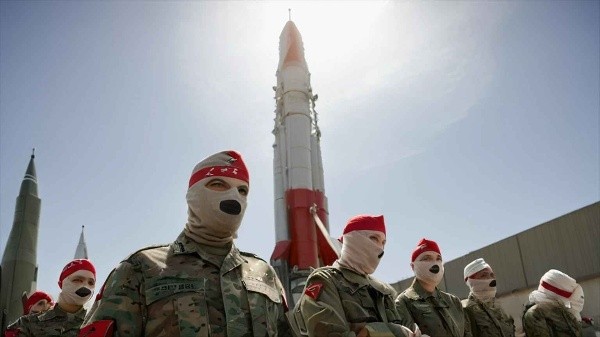Iran’s Plan to Strike Back Against the U.S.
Iran’s Military Preparations Following U.S. Attacks
Loading...

As allies continue to pressure Tehran, the Islamic Republic is wondering who will benefit from a possible war in the region
Tehran's Strategic Patience: Is a Response Imminent?
The assassination of Ismail Haniyeh, a prominent Hamas leader, in Tehran in July 2024 has escalated tensions between Iran and Israel, reigniting fears of a full-scale war. This incident is the latest in a series of events that have put Iran under immense pressure. Notably, a terrorist attack in Kerman, an assault on the Iranian consulate in Damascus, and the deaths of high-ranking officials, including President Ibrahim Raisi, have all contributed to the volatile situation. These incidents have placed Iran's leadership in a position where retaliation seems inevitable, both to assert its strength and to reassure its population.
Pezeshkian's Reformist Vision Collides with Reality
Ismail Haniyeh's visit to Tehran was initially intended to attend the inauguration of Iran's new president, Masoud Pezeshkian, who represents the reformist wing of Iranian politics. Pezeshkian’s inaugural speech highlighted his desire to reduce tensions with the West and normalize economic relations despite ongoing sanctions. However, the assassination of Haniyeh immediately overshadowed these aspirations, sending a clear message that Iran’s adversaries are willing to cross any line to challenge the nation.
For weeks, the global community has been on edge, speculating on how and when Iran will respond. Israel's heightened security measures, including the closure of its airspace, reflect the fear that Tehran's retaliation is imminent. Yet, Iran's silence has only deepened the tension, with many wondering if Tehran is playing a long game, waiting for the opportune moment to strike back.
US Pressure and Diplomatic Maneuvering
Amidst this tension, the United States has been actively working to prevent a further escalation. The Biden administration, keen to avoid a new conflict that could complicate the upcoming elections, has reportedly used intermediaries to convince Tehran to refrain from attacking Israel. US officials, including Secretary of State Antony Blinken, have even suggested direct negotiations with Iran's Supreme Leader, Ayatollah Ali Khamenei, to de-escalate the situation. The fear in Washington is that a war with Iran could strengthen the position of Israeli Prime Minister Benjamin Netanyahu and shift the balance in the US political landscape.
Iran's Calculated Silence
Despite the pressure, Iranian officials have remained ambiguous about their intentions. President Pezeshkian has been in communication with various world leaders, including Russian President Vladimir Putin and French President Emmanuel Macron, stressing Iran's right to retaliate. However, the absence of immediate action suggests that Tehran is carefully weighing its options, aware that any response could have far-reaching consequences.
Israel, for its part, has not officially acknowledged responsibility for Haniyeh's assassination, possibly as a way to maintain plausible deniability and avoid direct confrontation. Meanwhile, Iran is taking its time, likely considering the broader geopolitical implications of any military action. The ongoing negotiations between Hamas and Israel in Qatar and Egypt further complicate Tehran's decision-making process, as a harsh response could derail these talks and worsen Iran's strategic position.
Internal and External Pressures
Iran's leadership faces a complex dilemma. Domestically, there is growing pressure from the population and conservative factions who demand a firm response. Yet, Iran must also consider the potential backlash from its regional allies. Reports indicate that Iran's relations with groups like Hezbollah have been strained, as Tehran's calls for restraint have been met with frustration. Hezbollah, in particular, has advocated for a more aggressive stance against Israel, including large-scale military operations.
However, Tehran is aware that any hasty action could backfire, playing into Israel's hands and potentially dragging the United States into the conflict. This awareness has led to a cautious approach, as Iran seeks to balance the need to assert its authority with the risks of a broader war.
The Future of Iran-Israel Relations
In conclusion, Iran's delayed response to the assassination of Ismail Haniyeh reflects a strategic calculation. Tehran is not eager to be drawn into a war that could undermine its broader goals of economic recovery and regional integration. While the pressure to retaliate is immense, Iran’s leadership appears to be playing a long game, waiting for the right moment to act. As the clock ticks, the world watches to see if Iran will indeed "swing its fists after the fight," or if cooler heads will prevail, preventing a new and potentially devastating conflict in the Middle East.
BMM - MBA
Iran’s Military Preparations Following U.S. Attacks
Troops remain in five strategic locations, raising fears of renewed tensions and long-term occupation.
Opposition forces have taken control of the capital after a significant offensive. Here is how it unravelled.
